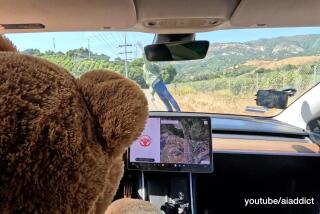Toyota calls in Exponent Inc. as hired gun
- Share via
When some of the world’s best-known companies faced disputes over secondhand smoke, toxic waste in the jungle and asbestos, they all turned to the same source for a staunch defense: Exponent Inc.
Now that same engineering and consulting firm has been hired by Toyota Motor Corp. as it seeks to fend off claims that sudden acceleration in its vehicles could be caused by problems in its electronic throttle systems.
A 56-page report that Menlo Park, Calif.-based Exponent sent to Congress on Feb. 9 found that the system behaved as intended and that Exponent was “unable to induce . . . unintended acceleration or behavior that might be a precursor to such an event.”
But Exponent’s research has come under fire from critics, including engineers, attorneys and academics who say the company tends to deliver to clients the reports they need to mount a public defense.
“If I were Toyota, I wouldn’t have picked somebody like Exponent to do analysis,” said Stanton Glantz, a cardiologist at UC San Francisco who runs a database on the tobacco industry that contains thousands of pages of Exponent research arguing, among other things, that secondhand smoke does not cause cancer. “I would have picked a firm with more of a reputation of neutrality.”
Mike Gaulke, executive chairman of Exponent and an employee of the company since 1992, called critiques that it produced only favorable research a “cheap shot.”
“Do we tell our clients a lot of what they don’t want to hear? Absolutely,” Gaulke said.
He said the firm often comes up with results that don’t favor clients, although he couldn’t provide specific examples.
Toyota says that it stands by the study -- and the company.
“Exponent’s credentials are widely recognized and the firm has conducted testing for a wide variety of clients from the corporate, government and nonprofit sectors,” said Toyota spokesman Mike Michels. “We believe they are an appropriate choice to conduct independent testing of electronic control systems. Their research will be comprehensive and subject to peer review as well as public inspection.”
In the more than 40 years since it was founded by a group of Stanford PhDs, Exponent has worked for clients including Boeing Co., General Electric Co. and Ford Motor Co., primarily providing research for defense testimony in lawsuits.
According to Gaulke, 65% of the company’s revenue comes from materials for litigation.
Boasting $228 million in annual revenue, the company employs about 900 people, about one-third of them holding doctorates. The company, formerly named Failure Analysis Associates Inc., changed its name in the 1990s.
In the late 1980s, it was hired by Suzuki to conduct tests that showed that the Samurai sport utility vehicle wouldn’t tip over during turns at 38 mph, disputing research published by Consumer Reports magazine. In Exponent’s research, the Samurai successfully completed turns at 43 mph. It called the Consumer Reports test “stunt like.”
About 10 years ago, Ford, General Motors Corp. and Chrysler hired Exponent to help with their defense in a slew of lawsuits filed by mechanics who alleged that asbestos in brakes caused them health problems. Exponent’s findings upheld the automakers’ argument that the brakes were not a hazard.
The firm was hired by Exxon to show that a double hull probably would not have prevented the Valdez disaster of 1989. It was also hired by NASA to help determine causes of the Challenger shuttle explosion, and by the Federal Emergency Management Agency to survey the damages to the Alfred P. Murrah Federal Building after the Oklahoma City bombing.
Swiss Re, an insurer of the World Trade Center, hired Exponent after the Sept. 11, 2001, terror attacks to argue its case that it should have to pay only half the $7 billion in claims sought on the grounds that the collapse of one tower would have compromised the entire complex even if the second tower had not fallen.
Last May, the Amazon Defense Coalition alleged that an Exponent study finding that dumping oil waste in the Ecuadorean rain forest did not increase cancer rates was tainted because the firm’s largest shareholder was a member of the board of Chevron Corp., which commissioned the study.
“The director involved was an outside director,” Gaulke said. “I doubt he knew that we worked on that.”
In the Toyota study, Exponent purchased six Toyota and Lexus vehicles from the 2002 through 2008 model years, testing them and comparing their performance to a 2008 Honda Accord.
The report describes how the Toyota electronic throttle control system operates and a few experiments that attempted to disrupt the normal function of the throttle, with no results.
“In all cases, the vehicle either behaved normally or entered a fail-safe mode where engine power was significantly reduced or shut off,” the study found.
But the tests described by Exponent did not appear to duplicate the sophisticated methods that automotive engineers say are needed to ensure that electromagnetic interference does not cause failure of the hardware or software of engine controls. Indeed, Exponent did not say it placed any Toyota vehicle in a test chamber that automakers routinely use to bombard cars with high-powered electromagnetic signals known to disrupt automotive electronics.
Cindy Sage, an environmental consultant in Santa Barbara who specializes in electromagnetic interference, said that much more extensive testing than described in the report would be necessary to find a potential problem.
Sage, who has faced off against Exponent witnesses on safety issues in the past, said Toyota’s hiring of Exponent was telling.
“The first thing you know is that when Exponent is brought in to help a company, that company is in big trouble,” she said.
ken.bensinger @latimes.com
ralph.vartabedian @latimes.com
More to Read
Inside the business of entertainment
The Wide Shot brings you news, analysis and insights on everything from streaming wars to production — and what it all means for the future.
You may occasionally receive promotional content from the Los Angeles Times.











